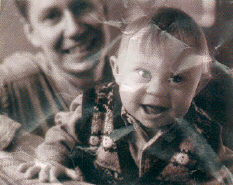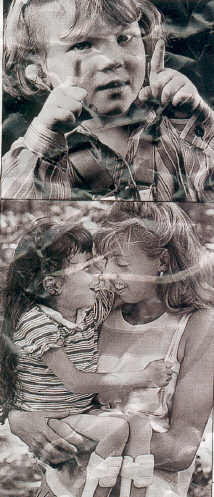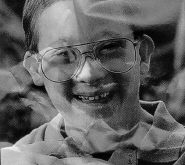|
From
the moment you hear the news, your family's life will change
forever. Here's how to deal with the realities and discover the
rewards.
Like most
expectant parents, Sandy and John Wimsatt of Encinitas,
California, shared a dream of the family life they'd soon be
living. Avid fans of the outdoors, they had
baby-makes-three visions of T-ball games, mountain biking, and
long hikes through the countryside. But when their son,
Michael, was 15 months old and started taking his first steps,
the Wimsatts noticed with increasing alarm that his legs seemed
to be collapsing under him. They took Michael to his
pediatrician, who ran a battery of tests and diagnosed him with
Spinal Muscular Atrophy (SMA), a disease of the spinal
cord. "There I was dreaming of taking my son to
soccer and going on these great family ski vacations," says
Sandy, "and suddenly, instead of sports equipment, I was
thinking about wheelchairs." At that moment, she
says, "I felt as if my life had just shattered."
For parents first
learning of a child's disability, shattered expectations are a
near-universal reaction, accompanied by a wide variety of
emotions, including anger, disbelief, shock, guilt, and
sorrow. Essentially, says Margaret Silberman, PhD, a
psychologist in Aurora, Illinois, who counsels families with
special-needs children, "these parents are grieving,
mourning the loss of the idealized child." No one
who's been through it would deny that raising a child with
special needs is a life-altering experience. But as the
Wimsatts and so many other parents have learned, with support,
planning, and access to the right resources, it can also be
life-affirming.
Starting Over
In the first days
and even months after the diagnosis, parents may feel
overwhelmed. Even simple things like giving the news to
family and friends can seem daunting, especially for new parents
who were dreaming of stringing up balloons and sending out
engraved birth announcements. But there's no reason you
shouldn't do those very things, says Audrey Lewis, executive
director of the support group Friends of SMA: "It's
okay to be proud and to celebrate even if your child's not
'perfect.'" Sandra McElwee of Rancho Santa Margarita,
California, whose son, Sean, was diagnosed prenatally with Down
Syndrome, used his birth announcement to explain the disability
to friends and family; the announcement also confirmed that his
birth was a joyful event and invited phone calls and
visits. "Congratulate us," it read.
"We have a baby; we're a family now." If you're
not comfortable with a printed message but don't have the time
or stamina to call everyone yourself, consider designating a
close friend or family member as spokesperson, says Lewis.
Caring for a baby
is demanding under any circumstances, but caring for one with
special needs is often exponentially difficult and demands
inspired solutions. Kathryn McKellar and her husband, Rick
Barto, of Cupertino, California, had to contend with the normal
new-baby stresses of sleep deprivation, diaper-changing, and
doctor visits. But because their daughter Jackie was
seriously developmentally delayed (she was finally diagnosed
with mild mental retardation at age 5), they faced additional
challenges. Seeing other children-including cousins-who
were progressing normally was particularly hard, says
McKellar. And day-to-day life was draining. "We
had to teach Jackie how to sit, how to crawl," she
says. Because Jackie had difficulty processing sensory
information, anything new or unusual was frightening and
overwhelming for her. "Just going to the doctor was a
nightmare," says McKellar. To ease the demands on
their time, McKellar and her husband agreed that she should take
a leave of absence from her job as a business manager. In
fact, many parents find it necessary to reconfigure their
lives-cutting back on work, selling secondary businesses, hiring
full or part-time help--especially in their child's first few
years.
For parents like
Martha and Alexander Bootzin of San Francisco, attending to
medical needs can be a round-the-clock job. Their son
Everett, was a "micropreemie." Born at 25 weeks
and weighing only 1 1/2 pounds, he spent three months in the
intensive care unit. When he finally went home at 4
months, pulmonary, eye, and digestive problems necessitated
constant monitoring. "He was on oxygen and many, many
medications," says his mother. "His intestine
was leaking, and he had doctor's appointments nearly every day
for months." The most difficult aspect of her son's
multiple disabilities, she says, was "our immersion in the
medical world"--at a time when she had expected to be
worrying about nothing more than getting her baby to sleep
through the night. The solution for the Bootzin family was
ample support--in their case, from their church, where Alexander
was music director. "We had twelve people we called
'cuddlers'--nurses, pediatricians, and super-qualified
grandmothers--who'd rotate and come over to take care of
Everett. It was just phenomenal," Martha says.
Lean on Many
In fact, setting
up a support system to help with day-to-day duties and
unanticipated crises, and to give emotional support, is crucial
for parents of a special-needs child. Symme Trachtenberg,
director of community education at the Children's Hospital of
Philadelphia, advises parents to start close to home, as the
Bootzins did, with family members, friends, or clergy.
However, in a culture that puts a premium on self-sufficiency,
this isn't always as easy as it sounds, "especially for
couples who've worked hard to become independent,"
Trachtenberg says. But if you need help, ask for it, she
stresses,; don't expect others to intuit your needs.
McKellar wrote to family members right after Jackie was
diagnosed with Developmental problems, both to offer information
and to ask for their support. Her sister Debra in
particular has been an invaluable source of aid, moving to
California from Wisconsin to be closer to the family.
"Aunt Dub", as Jackie calls her, "has been
willing to learn along with us," says McKellar, and can now
step in whenever the family needs help, whether that means
taking Jackie out for pizza or calming and comforting her.
While most friends and family can't be expected to offer this
kind of extensive help, they'll almost certainly be willing to
babysit, pitch in around the house, lend a sympathetic ear, or
help with other siblings when time is tight--as long as you make
your needs known.
To be the best
possible advocate for your child, you need to learn as much as
you can about your child's particular disability--not just
medical details but information on resources, government
programs, and educational and recreational opportunities.
Barbara Cheadle, founder of the National Organization of Parents
of Blind Children, advises parents to "blink back the
tears, reach out, and get information. If you live in
denial, you can't help your child."
This is
especially true in the years from birth to age 3, when children
can benefit most from early-intervention programs, like those
mandated by the Americans with Disabilities Act of 1990.
These programs are tailored to your child's individual needs and
offer physical, psychological, occupational, speech, and other
therapies, provided either in your home or in a center.
(For information, contact your state department of mental health
or local board of education.) For the McElwee's son, Sean,
an infant stimulation program for babies with Down Syndrome-in
which parents are taught to administer physical therapy to help
children raise their head, sit up, and achieve a host of other
milestones--was a huge benefit. "It sped my
son's development incredibly", says his mother.
"He sat up on time and walked at 22 months"--well
before she expected.
Other excellent
sources of information and assistance are national support
groups or parent-to-parent networks, some of which focus on a
specific disease or disability. Linda Rowley of Mineral
Point, Wisconsin, whose son< Mitchell, is paralyzed from the
neck down and a result of Spina Bifida, started her own Internet
network, Spina Bifida Parents, six years ago, partly in an
effort to find other families whose children were as severely
affected as her own. "A lot of the other parents I'd
met talked about bracing and walking," she says, "but
walking wasn't even an option for my son, so it was hard to
listen to that." Finally speaking to people who knew
what she was going through was "enormously
comforting".
Many
organizations hold annual conventions, which offer an
extraordinary opportunity to meet experts and other parents
face-to-face. For Sandy Taboda of Baton Rouge, Louisiana,
whose son Michael lost his sight at 2 1/2, a visit to a National
Federation for the Blind convention was a turning point in her
life and his. When Michael's blindness was first
diagnosed, Taboda says, "the only thing I could think of
was the stereotype of the blind man on the corner selling
pencils--it was devastating." The convention not only
taught her about the resources available to her son, but it also
completely blasted her misconceptions. "I saw
hundreds of blind individuals who were successfully living their
lives," she says. "It was such a boost to see
what my son might become."
Keeping Your
Balance
Daily care and
finding the right services for your child can easily become the
entire focus of your family life, and that can put a strain on
your marriage. For any married couple, it's important to
communicate and make time for each other, but it's especially
critical in special-needs families, where stress can whittle
away at relationships. Ever since their son, Mikey, was
born with Down Syndrome, Michel Paul and her husband Thomas, had
been focused intently on his needs. Then, not long ago,
"we realized we were drifting apart," Michel
says. "We saw that we had to start taking care of
ourselves, too." The Pauls found a sitter they
trusted and made going out as a couple part of their
routine. Their rule for those nights out: "not
to worry about our son and not to talk about the hospital."
Even more
critical than spending time alone together is talking openly
about your emotions. "Parents often have particular
trouble discussing 'difficult' feelings--being angry with their
disabled child, for instance," says Stanley Klein, PhD,
author of You Will Dream New Dreams; Inspiring Personal
Stories by Parents of Children with Disabilities (Kensington
Books, 2001). But it's important to remember, he says,
that it's normal to feel angry and frustrated, and sharing these
feelings is crucial to help you deal with them and to cement
your marital bond.
Like spouses,
siblings in special-needs families are often unduly stressed,
either from the responsibility of caring for the disabled child
or because they feel ignored. "Any child is going to
miss the attention when there's a new baby in the family,"
says Mary McHugh, author of Special Siblings: Growing Up with
Someone with a Disability (Hyperion, 1999), "But if the
baby has a disability, there will be even less time for older
siblings." Although it may be tough to arrange, it's
key to spend exclusive time with each child, says Trachtenberg,
and to make sure you don't overburden siblings with caretaking
responsibilities. If things get rough, look into programs
where kids get a chance to blow off steam with others in similar
circumstances, such as the Sibling Support Project, a
Seattle-based organization that promotes workshops around the
country (www.seattlechildrens.org/sibsupp). There is also
an upside for brothers and sisters: Trachtenberg's
research on siblings of children with disabilities showed that
they demonstrated "increased maturity, a sense of
responsibility, a tolerance for being different, and enhanced
self-confidence and independence."
In the end, the
greatest asset for special-needs families is a positive
attitude. Raising a child with a disability offers a host
of rewards that may not be evident in the early days, says
Trachtenbert: a new sense of personal competence for parents,
the thrill of watching your child make strides, and increased
appreciation of family and life in general. Of course, it
takes time and experience to get there, along with a concerted
effort to find as normal a life as possible for your child and
the entire family. Sandy Wimsatt, who dreamed of sharing
her love of sports and the outdoors with her son, says success
in dealing with a child's disability comes from adjusting your
goals to reflect life's new realities. She and her
husband, for instance, were able to find a wheelchair soccer
program for Michael, and they've taken him to adaptive ski
school, where he's learned to ski using specialized
equipment. They've even managed to go on family biking
expeditions with the help of a heavy-duty bicycle seat.
"And so we have our dream," says Wimsatt.
"It's just a different dream now."
|


|
Let's
Talk About It

Once considered unmentionable,
disabilities are increasingly visible in our society--in films,
TV dramas and sitcoms, and in cartoons such as Nickelodeon's Pelswick.
At home, it's even more critical to treat your child's
disability in an open, honest manner.
As they get older, children will
inevitably have question. "Am I 'different' from
other kids?" "Will I be able to do the things my
brothers and sisters do?", but "they may not be able
to articulate them", says Barbara Cheadle, founder of the
National Organization of Parents of Blind Children. Left
unaddressed, questions can blossom into fears or
misunderstandings. Cheadle cites the example of blind
children who simply believed they would "grow out of
it" because no one told them otherwise.
Siblings too benefit from
straight talk, says author Mary McHugh, who grew up with a
brother with Cerebral Palsy. "Parents are often so
busy running around trying to find the right doctor, the right
help, that they forget to sit down and explain things to the
other children in the family," she says. Tommy
Slivinski of Landing, New Jersey, was 4 when his 6-month-old
sister Francesca, was diagnosed with a seizure disorder.
But it wasn't until several years later that he began to
manifest anxieties about it. "He was crying every
day," says his mother, Carmela. "And there were
times that he was afraid of having seizures himself."
In fact, a fear of "catching" the disability, or guilt
at having somehow caused it, are common reactions.
According to McHugh,
communication--giving the disability its proper name and
explaining what that means--can head off anxieties. Sandy
Taboda, who has always discussed her son Michael's blindness
honestly, says that for him and his younger brother, Robert, the
disability is just one of Michael's many characteristics:
"He has brown hair, he's eight years old, he's blind."
|
![]()
![]()
![]()